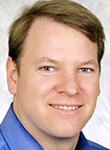Chris Schaffer to advise on science policy in D.C.
By Anne Ju

Chris Schaffer will bring a scientist's perspective to Capitol Hill starting this September when he begins a yearlong congressional policy fellowship.
Schaffer, associate professor of biomedical engineering, has been awarded an Arthur H. Guenther Congressional Fellowship, supported by the Optical Society of America and the International Society for Optics and Photonics, and administered by the American Association for the Advancement of Science. He will spend a sabbatical year in Washington, D.C.
Guenther fellows, according to the organization's website, work in the office of a U.S. senator or representative, or with a congressional committee, to get firsthand knowledge of congressional operations, contribute to the policymaking process, and forge links among the engineering, scientific and public-policy communities.
Schaffer, a broadly trained scientist with research interests ranging from physics and optics to biology and neuroscience, hopes to provide input into policy issues where science or technology advice are needed. He feels that an interdisciplinary scientist's perspective could be valuable in many areas including science funding, energy, climate change and education.
"It seems there is an enormous fraction of bills that have a significant technical component," Schaffer said. "One thing I'm looking forward to is having the 30,000-foot-view of science policy."
Schaffer's lab at Cornell, which he runs with research associate Nozomi Nishimura, uses advanced optical techniques to observe and manipulate in vivo biological systems, with the goal of understanding normal and disease-state physiological processes in the central nervous system.
He has collaborated with both physicists and neurobiologists. He hopes this background and "habit of being self-taught" will be useful in his role in Washington, which he sees as a public service.
Schaffer also said he is dedicated to the concept of communicating science clearly and to training people in his labs and classes to be effective communicators.
"I've come to appreciate the value of being able to accurately convey scientific ideas without technical language … by talking about key concepts, rather than details and jargon," he said.
Media Contact
Get Cornell news delivered right to your inbox.
Subscribe